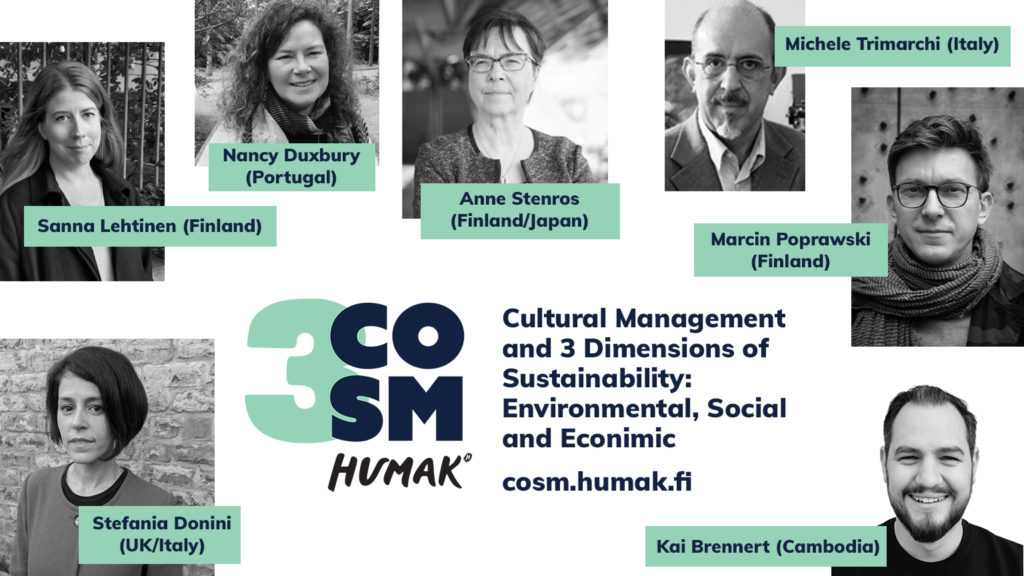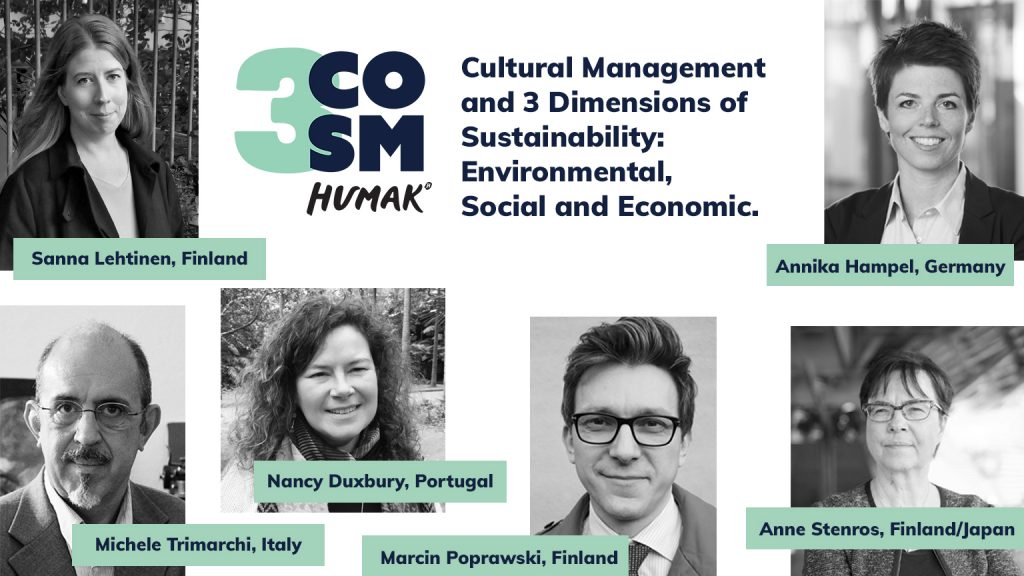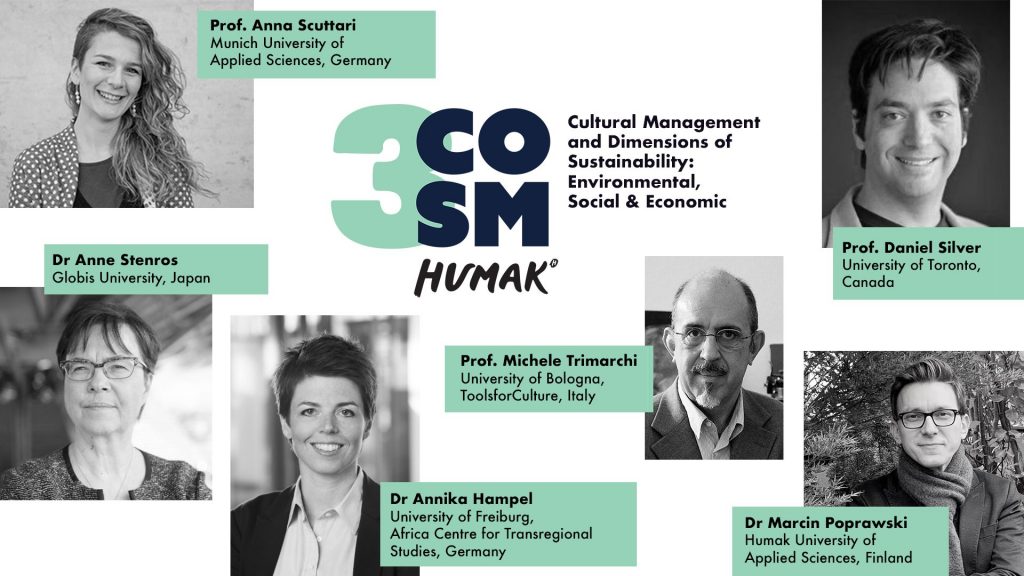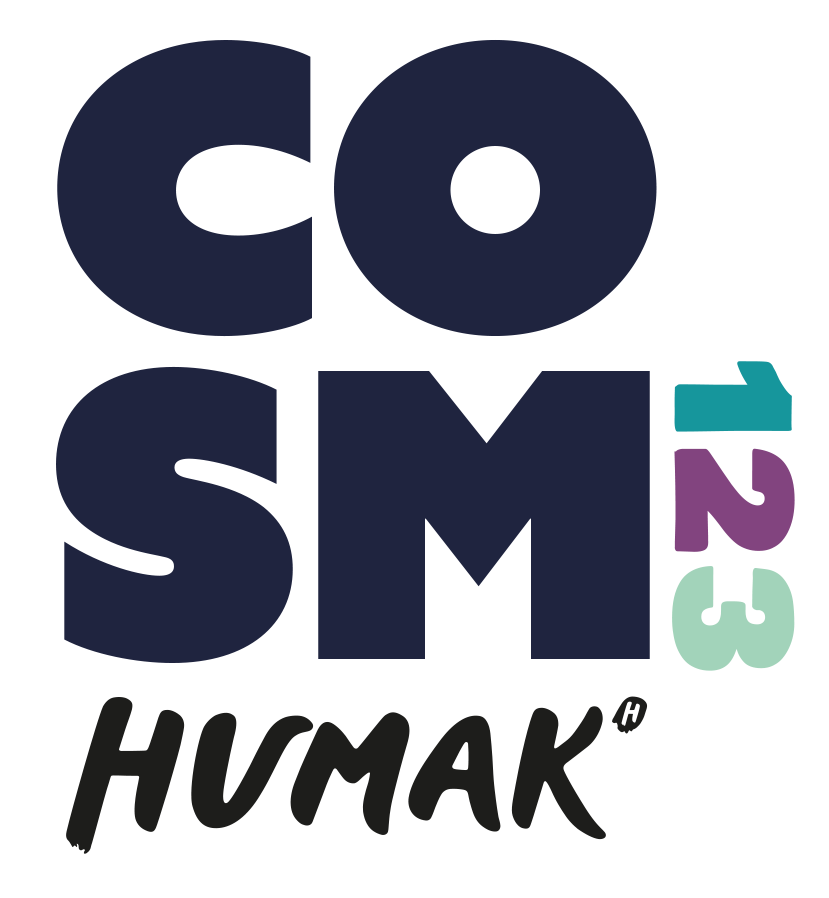COSM 3 – Cultural Management & 3 Dimensions of the Sustainability: Environmental, Social & Economic is a 5 ECTS MA level course that provides an international and cross-disciplinary perspective on cultural management and sustainability values, engaging the expertise from abovementioned research areas of sustainability. Its aim is to acknowledge, adapt and strengthen the role of cultural managers in supporting the general sustainability movement, impacting people’s and industries’ pro-ecological behaviours, assisting all types of attempts to make our life more sustainable, ethical, responsible, or balanced – in environmental, social, and economic sense. And finally, this part of the module is also questioning the answers regarding cultural organizations and cultural professionals’ role in balancing their cultural ecosystems.
This course can be selected as a separate unit or as a third part of the whole COSM series of three courses (15 ECTS). This is the revised version of the course that went through the pilot stage of testing in Spring 2021 and was highly evaluated by all participants. As a blended learning process, it comprises of (a) 4 sessions with international and Finnish guest lecturers, facilitated by the host lecturer of the course, Dr Marcin Poprawski; (b) the access to the interactive Hoodle platform with the content to be studied by participants. The platform gives access to literature files, video materials, and digital sources. Webinar 4 (that gives a hybrid learning option) is organised in the classroom of Humak UAS in Helsinki and broadcasted life online as a zoom session. Webinars 1, 2 and 3 are entirely online zoom webinars.
The sixth edition of COSM courses will start in the Spring 2024 in January 2024 (with the registration deadline of 19.1.2024 for the third course). You can register on Humak University Open University Web Shop. Contact Us to get more information!
Amongst carefully selected and invited experts and guest lecturers who share their experience and knowledge through COSM 3 are inspiring individuals from Finland and Japan, Italy, Scotland, Cambodia and Portugal.
Guest lecturers (6th edition):

Kai Brennert (edge and story, Phnom Pen, Cambodia)
Anne Stenros (Globis University, Tokyo, Japan // Creative Catalys Oy, Helsinki, Finland
Michele Trimarchi (Tools for Culture, Rome, Italy)
Nancy Duxbury (University of Coimbra, Portugal)
Sanna Lehtinen (Aalto University, Helsinki, Finland)
Stefania Donini (Paisley Museum, Scotland, UK)
Host lecturer:
Marcin Poprawski ((Humak University of Applied Sciences, Helsinki, Finland)
Content
- Beyond prepositions, assumptions, and contradictions. Culture in, for or as Sustainability
- Environmental and urban planning dimensions of sustainability and the role of cultural Ecosystems.
- Cultural Tourism and Sustainability
- Social dimensions of Sustainability, cultural audiences, and culture & arts professionals
- Public Health policies and cultural organisations – the pandemic lesson
- Inter-generational aspect of sustainability – cultural management applications
- Economic sustainability through cultural management lenses – global and local perspective
- Cultural matters on the edge of protection and free access, conservation, and change
Objectives
Students are able to acknowledge, adapt and strengthen their role as cultural managers in supporting the general sustainability movement, impacting people’s and industries’ pro-ecological behaviours, assisting all types of attempts to make our life more sustainable, ethical, responsible or balanced – in environmental, social and economic sense. The course aim is to activate different streams of students’ activity regarding culture & sustainability values: interaction, cooperation, reflection, written argumentation and dialogue in conversation. The course is a safe space for questioning the answers and providing solutions regarding cultural professionals’ role in balancing their ecosystems. It’s above all about confronting cultural management practice with environmental, social, and economic dimensions of sustainability.
After completion of the course the participant:
- can recognize unsustainable practices in cultural production and cultural management activities,
- can share in her/his professional environment the essential questions, dilemmas, values, and content related to sustainability issues in cultural managers work, including environmental, social, and economic dimensions,
- strengthens her/his role of cultural manager in supporting the general sustainability movement, impacting people’s and industries’ pro-ecological behaviours, assisting all types of attempts to make our life more sustainable, ethical, responsible, or balanced – in environmental, social, and economic sense,
- can propose sustainability-oriented solutions, interact, fairly cooperate, reflect, write, and advocate regarding key sustainability related issues in cultural production practice in domestic and international contexts,
- can provide sustainability-oriented proposals related to the intergenerational transmission of cultural values.
- can recognise the key challenges of economic, social, and environmental sustainability in cultural and creative sectors,
- can apply in cultural workplace some sustainability-oriented audience centric solutions with the use of audience development logic and terminology
Evaluation
1-5 Finnish grading scale; assignment formats: groupwork, readings & discussion sessions, short essay, individual application plan of the course content;
COSM 3 schedule in the Spring 2024 (6th ed.) – 4 sessions, 4 hours each – dates tba soon.
30.1 Tue, 13:00-17:00 EET (hybrid, Ilkantie in Helsinki and zoom session option)
6.2. Tue, 13:00-17:00 EET (online zoom session)
27.2 Tue, 13:00-17:00 EET (online zoom session)
12.3 Tue, 13:00-17:00 EET (hybrid, Ilkantie in Helsinki and zoom session option)
Experiences and testimonials of participants of the first edition of COSM 3 (Spring 2021):
The course was great! I really enjoyed participating and learned a great deal. I attended the course primarily because I wanted to learn more about this topic and, as such, I have read all the papers and participated in the group task. I enjoyed this course very much! I am very happy that I attended and cannot stress this enough. Luna Salazar
All COSM courses have been extremely important and good. They go into the deep waters of cultural production; the topics are broad and global! Billion thanks to you for all the COSM courses! Salla Raunio
I am really happy that I joined all three courses. It has helped me a lot with my thoughts on my Master Thesis. Lena Hüttl
I like the interactive approach of this course. There was good balance between the webinars, group work and theory. We were well guided through different topics and the guest lecturers were inspiring. There was also always the time for discussion. Many of the topics were previously unknown to me, they offered new approaches for sustainability. Group work was good way to explore and adjust the things we were learning in ‘practice’. Pia Repo
I like the group work and the discussion based on them both in webinars and in our own time. So much has happened! This has been such a great course and ensemble. COSMs are just the best I’ve come across in years. I give praise because theory has become practice and that is exactly why I am studying. Big thanks for the whole COSM 3 and all the COSMs! This has been a great way to learn! Mayreth Wolff
In fall 2020 I tried to find some interesting courses to study. I did not find any where I could commit or see that they would be interesting for learning something new and add something to my professional self. COSM is something I could commit to, and I am glad that I took the courses. The great thing was also that we got global viewpoints. This was important to me. But in all COSM courses, the best was our group works. Jiri Ahonen
Past editions’ guest lecturers:



